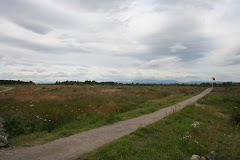We had a good Fourth. We visited old friends from school and boated in the sound. After the teenage boys took their turn on the ski bisquit, it was the middle-aged men's turns. I was initially hesitant. I like being able to get out of bed the next day. The fun factor enticed me to give it a try. Several runs later, with attempts by the helmsman to slingshot me off of the bisquit on the turns, I returned to the boat a little out of breath and a little sore, but a lot happy. And I was able to get out of the bed the next day, slowly, but out all the same.
Here's some more on Scheer's book. He objects to congregational singing as merely a warm up to the real spiritual meat of the sermon. For him, congregational singing plays a signifcant role in spiritual formation. It puts the Christian faith on the tongues of people, letting it work its way down to the soul.
Scheer refers to congregational song as "functional art," that is what human beings without rehearsal can do -- namely, "sing simple structures in an idiom they understand, structures that make logical musical sense, so that they can be remembered easily enough for singing among normal people." [p. 60] Scheer doesn't say this, but I will. "Functional art" seems to be synonmous with "folk art," whether it's music or painting or sculpture.
Scheer does a nice job of explaining the traits of songs sung most enthusiastically by any given congregation. Since most people in a congregation are untrained singers, their needs and abilities need to be taken into consideration when selecting congregational songs. It is evident to me when I have selected a winner and when I have selected a dud. According to Scheer, the traits of singability, lyric quality, and music scalability separate the winners from the duds. A song, on average, is singable by a congregation when it avoids going below B-flat below middle C and above the D a tenth above that. Singable songs are also rhythmically simple and in a learnable form that fosters memorization (call and response, stophic, verse-chorus-bridge).
A song's lyric quality is determined by its theology. Scheer suggests that "every song should express some aspect of truth, but no single song can express all truth. Revealing the whole theology is the role of repertoire; each song is one piece of that unfolding revelation." [p. 63]
Lastly, there's music scalability. For Scheer, songs should provide a simple point of entry that is accessible to all and at the same time include sophisticated musical elements that will retain the interest of the musically advanced. In other words, again I will quote Scheer: "The important thing is that the melody can be sung by children and non-musicians, and that the song is flexible enough to allow for increased musical contribution with repeated use."
I am in Winchester this week -- practicing the guitar, practicing the bagpipes, reading and writing, playing some golf, and, if this torrid weather breaks, perhaps some fishing as well. Although, according to the comments section of the blog, the fishing is slow and hard.
I leave for the UK on Saturday. First, Christchurch Oxford. Then, the Piping Centre in Glasgow. Then, Edinburgh and the Highlands. Lisa and the children will be joining me for the last leg of my UK adventures. So too will Lisa's parents.
I haven't landed on my reading list for this week just yet. When I do, I will post it.
That's it for the moment. Peace.
Saturday, July 7, 2007
Subscribe to:
Post Comments (Atom)
Links worth visiting
- Dan Kimball's website -- Dan is author of The Emerging Church and pastor of Vintage Church, Santa Cruz, CA
- Calvin Church, Zelienople, PA
- Calvin Institue of Christian Worship
- William and Mary's DOG Street Journal
- Brian McLaren's hompage -- author, speaker, activist
- Isabella Stewart Gardner Museum, Boston, MA
- JFK Presidential Library and Museum, Boston, MA
- My writing instructor at Oxford's Summer School
- Homepage for Oxford University's Oxford Experience
- Simon Fraser University Pipe Band
- One of the guitarists with whom I studied in Maryville
- For the bluegrass music fan with details about the bluegrass guitar camp I will be attending
- Montreat: The starting point for hiking western NC's Blue Ridge wilderness
- For citizens of Red Sox Nation
- My home and place of study while in Glasgow, Scotland, UK
- Here's the site of the bluegrass guitar camp in the TN Smokies
- Take a virtual tour of Cooperstown's Baseball Hall of Fame
- Barnwell Inn: My B&B home away from home in Cooperstown, NY
- First Presbyterian Church, Winchester, VA, USA





















No comments:
Post a Comment